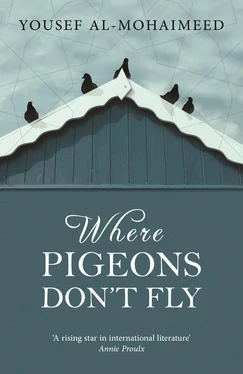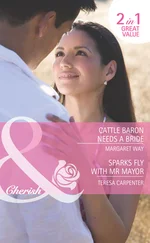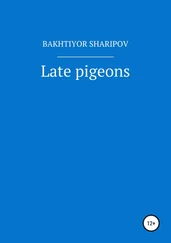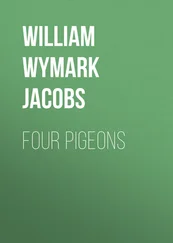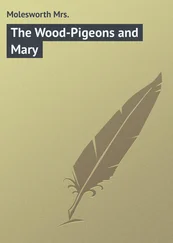Tarfah’s mobile rang and she picked it up, thinking that maybe Nada had noticed her missed calls. But when she looked at the screen, blinking on and off in the darkness, her face fell and she didn’t answer. ‘What does he want now?’ she spat.
‘Who is it?’ asked Fahd nervously.
‘My brother, Ayman.’
‘If you come back to the mall with me,’ she said, ‘I could tell Ayman that you’re a brother of one of my friends and that you need help. What do you think?’
He breathed deeply and went back to digging. His heart began to beat faster; his white robe was smeared with dust. He noticed a gaping hole next to where he was digging in the dark.
What if a huge snake suddenly slithered out from that burrow and bit him while they were all alone in the middle of nowhere?
Then he noticed the place was full of burrows. This city was all burrows — burrows upon burrows — and you never knew which burrow would swallow you up next.
With the long nail on his little finger he squeezed the valves on the rear tyres and the air rushed out. Deflated tyres gripped better in sand. He set the car in reverse: a metre backwards then the wheels spun again.
What was this? Was this the curse of Thuraya, with her feverish, miserable messages? She had already threatened to expose him as an artist who led women astray. Was it his mother’s, from whom he had fled and failed to call? Perhaps her health had reached breaking point and she needed his help.
He was about to open his mouth for the thousandth time to tell Tarfah, ‘I was worried about this ploughed land; it’s cursed for sure!’
Suddenly he stopped. If he walked into the field now he would never return.
He asked her about Nada. ‘She answered yet?’
‘I sent her a message,’ she replied in a soft voice, low with fear.
He stripped off his robe. His body had begun to sweat. A short while before this body had delighted in the paradise of alfalfa blooms as it gazed at the smiling, playful moon. Now the field had become a ploughed wasteland, empty and desolate, and the moon the brow of a wrathful demon gazing down gloating and mocking at a puny, isolated, powerless human being trying to extricate himself from disaster.
As he dug away and smoothed the ground behind the car her phone suddenly rang. It was her brother and she didn’t answer. Fahd tried to shift the car again, opening the door and watching the wheels as he repeated, ‘Oh God, oh God,’ over and over. The car moved a further two metres and sank again. This time, he felt despair take hold.
Her phone rang and she answered, smiling.
‘Listen, I’m in this place miles away. Get your driver to take Qaseem Road to Quwa al-Amn Bridge. He takes a right at the flyover then goes straight until he sees lights from a car.’
She fell silent and listened. ‘I’ll tell you later. Now’s not the time.’
Nada must have asked her what she was doing there.
By his efforts he had succeeded in moving the car backwards a total of seven metres.
‘I’m going to try going forwards,’ he said to Tarfah. ‘If the car gets free I’ll turn right and drive off.’
He put the car into first gear then stepped on the accelerator, wrenching the wheel left and right and screaming in English, action-movie style, ‘Come on! Come on !’ It moved slowly, then surged and he pulled the wheel to the right, straightening out and rocketing towards the highway like a lunatic until he reached the field of harvested alfalfa, where he proceeded calmly along the firm ground at its edge, unable to believe that they had escaped.
‘O wholesome harvest girls!’ he bellowed. ‘How great thy charity, harvesting this crop that I might proceed along the path to deliverance …’
And Tarfah, aping his pomposity with magnificent derision, cried, ‘What ails thee, Abu Jahl?’
— 33 —
THE WHITE PICK-UP TRUCK, stuck in the sand a quarter of a century before, on 30 July 1979, was nothing like the sea-blue Hyundai that Fahd drove with Tarfah beside him. In this vehicle sat a man, his shimagh wrapped into a filthy red-and-white checked turban around his head, driving like a lunatic through the dark of the night to escape the border guards, now dousing the headlights and proceeding on instinct, now guided by the light of his passenger’s small flashlight that prevented the guards tracking their Datsun. They were waiting for gunshots to catch them from the rear but the onslaught of the demented sand was swifter than any bullet; it held them firm, the pick-up’s lights suddenly froze and they fled in opposite directions, each man panting as he laboured to pluck his feet from the sand’s snare.
The passenger got furthest and when he heard the sound of the border guards’ pursuing vehicles and the powerful lamps begin sweeping the desert in search of them, he ran for the cover of a small and straggling ramth bush and lay still, his heart straining. He was like a bird grazed by a rifle, that flees flapping its one good wing, bleeding and hopping as it hunts for the shade of a tree or rock to hide from the hunter’s gaze.
The guards stopped their vehicle by the pick-up in the soft, paste-like sands. Their voices were strident in the night and the searchlights’ beams wandered about like cudgels cocked over bare flesh. They fanned out in three directions, away from the route they had come, and like swords drawn for the kill, four beams of light circled the desert.
The passenger trembled, hiding his head between the branches to appear like a tarpaulin abandoned in the scorching midday heat, but the light fell suddenly into his gleaming eyes and one of the guards cried out to his companions: ‘It’s him.’
Pointing a pistol at him, the guard shouted for him to get up with his hands behind his neck. Exhausted, his face filthy and holding his hands behind his neck, he rose to his feet. One of the guards came up behind him, patted his pockets, and securing handcuffs around his left wrist first, then his right, he steered the man away. A few minutes later they had found the other man and they took them both back, together with their truck, to the Ruqai Centre on the border with Kuwait.
The pick-up was impounded with seven other trucks, their loads concealed beneath green tarpaulins held in place with ropes wound round the brackets on the vehicles’ sides. After stepping forward with two other officers and cautiously uncovering one of the trucks, the border centre’s commander ordered the detention of the drivers and their passengers.
They were carrying stacked bundles of small pink pamphlets, on their covers the title: An Address on the Subject of the Emirate and the Swearing of Fealty and Obedience, and a Judgment on the Duplicity of the Rulers towards the Scholars and the Common People, and the Proper Position with regards to the Rulers in Particular, and People in General .
The duty commander at the border post sat at his desk, a copy of the pamphlet in his hand. He leafed through it rapidly, reading some of the Qur’anic verses and hadith , the first of which was Ibada Bin al-Samit’s report of their pledge of allegiance to the Prophet on the grounds that ‘… we must speak the truth wheresoever we be, for we are with God and so fear not the censure of critics.’ Flipping the pages with his thumb he read out loud to the two officers:
Know that some of those who fawn over kings and rulers excuse themselves by pointing to the hadith recorded in the Sahih Muslim, when a man addressed the Prophet, saying, ‘O Prophet of God have you not perceived that when princes are set over us they look to their own rights and deny us ours? What do you command us to do?’
To which the Prophet replied, ‘Hearken: they must bear their burden and you, yours.’
Читать дальше
